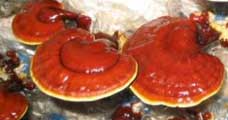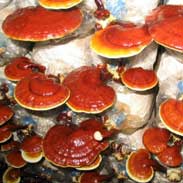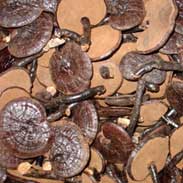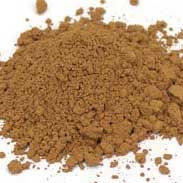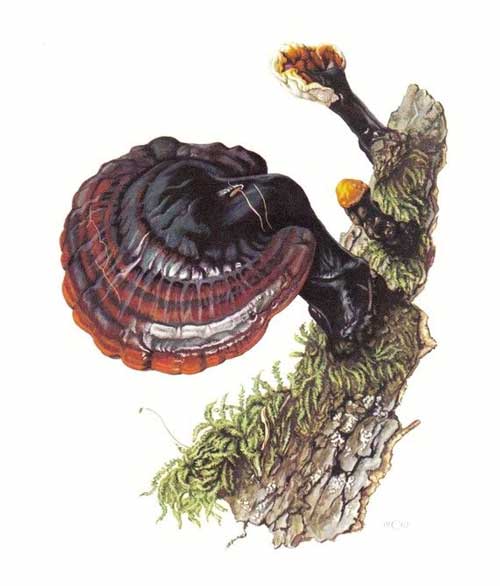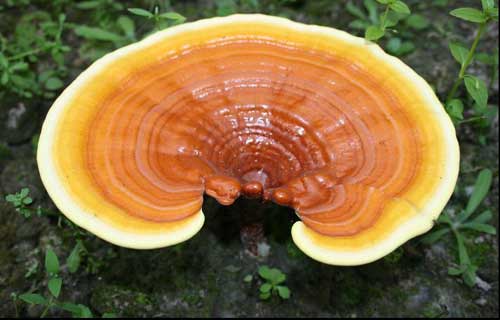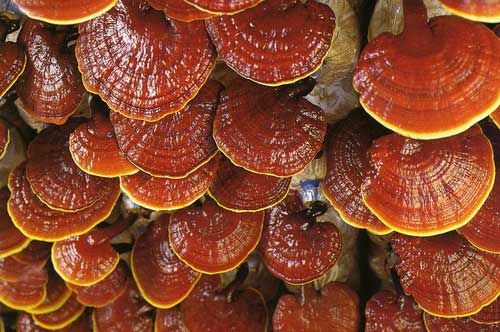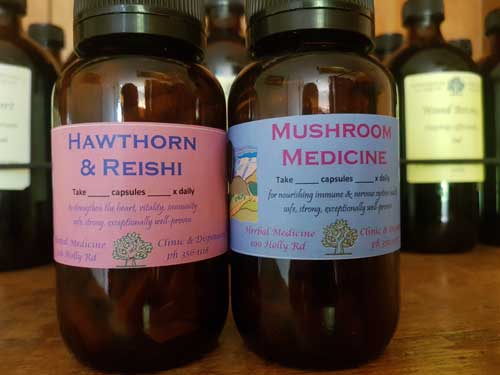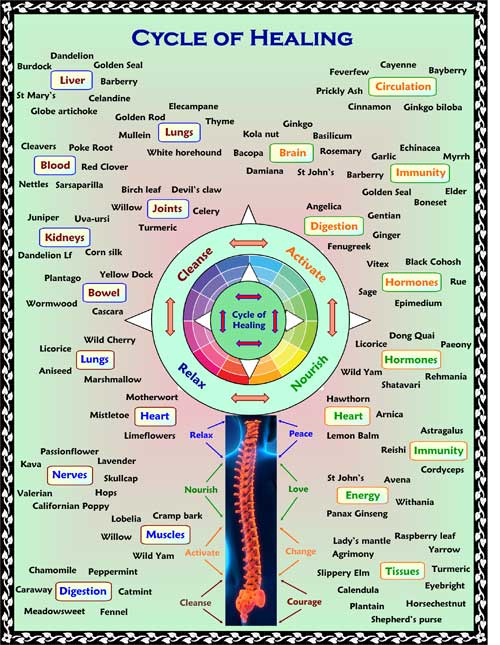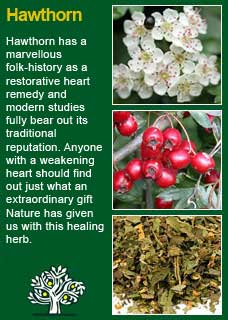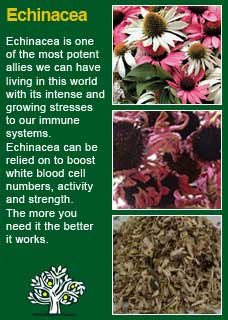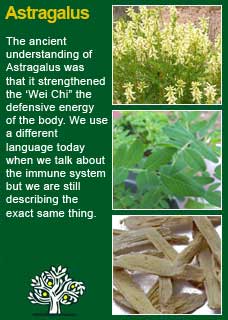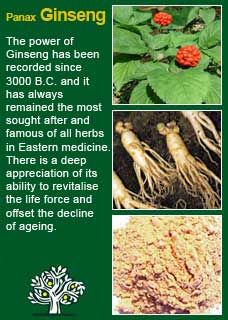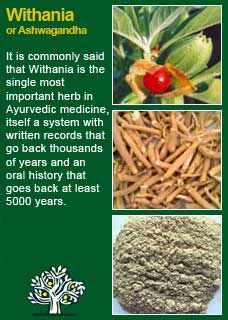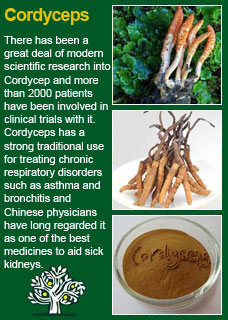
|
|
||||
| Our Pages ABOUT CONSTITUTIONAL MEDICINE
|
Common names for Reishi translate to things like ‘Auspicious mushroom’, ‘Immortal Wizard’, ‘Divine mushroom’, Sacred mushroom’ and so forth. It has been tremendously highly regarded in Eastern medicine.
This is a quote from a famous Chinese doctor which sums up the kind of esteem in which Reishi has been held: “Reishi positively affects the life-energy, or Qi of the heart, repairing the chest area and benefiting those with a knotted and tight chest. Taken over a long period of time the agility of the body will not cease, and the years are lengthened” L Shizhen from the year 1596. The many names referring to Reishi as a kind of spiritual mushroom would have been in no small part due to the practice of Taoist priests to search for Reishi in the mountains and to use the herb as part of their meditation practice to centre and still their minds. Reishi is about as far away from magic or psychedelic mushrooms as you can get, in direct contrast to such substances that can agitate visions or hallucinations, it is famous for its ability to quiet and still the mind. David Winston writes 'research on the chemistry, pharmacology, and therapeutic benefits of the Reishi mushroom have been extensive. It is an immunomodulator capable of strengthening the immune system (it enhances monocyte, macrophage and T lymphocyte activity) and down-regulating excessive immune system response in patients with immune dysregulation (auto-immune disease) and allergies. It contains polysaccharides that have been shown to stimulate a five-fold to twenty-nine fold increase in cancer-fighting compounds such as tumour necrosis factor, interleukins 1 and 6 and Th1 T lymphocytes. Thomas Bartram writes of the actions of Reishi that it is a 'anti-tumour, hypotensive, anti-viral, immunostimulant, antitussive, expectorant, antihistamine, antibacterial'. He writes that it is 'officially recognised in Japan as a cancer treatment as well as for side effects of radiation and chemotherapy. Candida, chronic fatigue syndrome, helpful to high blood pressure, allergies and to reduce blood fats'
Reishi is now widely available because the art of cultivating it (on Plum tree sawdust) has been refined over the last few decades but historically it was known as the "Phantom Mushroom" because it was so rare and difficult to find. For example, in Japan over ninety-nine percent of all the Reishi Mushrooms found growing in the wild are located on old Japanese plum trees and fewer than ten mushrooms can be found on 100,000 trees! Reishi also grows at the base of deciduous trees such as the Maple but only 1 or 2 in 10,000 of these trees has it naturally growing in the wild. There has been a great deal of modern scientific research into Reishi, especially through the state sponsored Chinese medical system which still uses herbs as its mainstream medicine. Reishi has particularly been identified as an agent that can help in the treatment of cancer and it clearly has many benefits to the immune system. ~ One hundred and thirty-two patients diagnosed with neurasthenia (fatigue), mild depression, and chronic fatigue immune deficiency syndrome took part in a study of Reishi's effects on these conditions. The group given the extract made from the mushroom had significantly superior reductions in fatigue and an improved sense of well-being compared with patients who received a placebo (A randomised, double-blind and placebo-controlled study of a Ganoderma lucidum extract in Neurasthenia; Tang et al, 2005) ~ Reishi has also been shown to improve the stickiness of the blood, to have tonic effects to the liver and to improve blood pressure and cholesterol (Shu S, M. Mori; Research on Ganoderma vol 1. Shanghai Med Univ, 1993,pp339-342) ~ Reishi is frequently used by mountain climbers to combat altitude sickness and is used in many of the performance enhancing herbal formulas used by Chinese and Japanese athletes (Jong SC, Birmingham JM, Adv Appl Micobiol 37,1992,101-134) ~ A series of studies has shown that Reishi has anti-inflammatory effects. One study showed that 220mgs of Reishi extract and 50mgs of Reishi powder had comparable effects to 5mgs of the steroid hydrocortisone (Stavinhoa WB et al. 3rd Academic conference, Japan, Aug 18-20, 1990) ~ A placebo-controlled study on 48 patients with advanced cancer showed that Reishi extract had pronounced immune benefits including an increase in T lymphocytes and a reduction in CD8 counts. Patients who received Reishi reported reduced side effects from chemotherapy or radiation as well as a faster post-operative recovery (Shiao MS et al. Am Chem Soc 547, 1994;342-354) (Kupin VA, 4th International Symposium on Ganoderma lucidum; Seoul Cancer Res Ctr, June 10, 1992,pp49-50) ~ Research into Reishi has shown that it has a group of active constituents called polysaccharides, it is these which have been demonstrated to have immune enhancing properties. Another group of compounds in Reishi are called triterpenes and these substances have been shown to have anti-allergy, stress relieving and blood pressure lowering properties (Tomada M et al. Phytochemistry 25:28, 1988:17-20) ~ The authors, titles and the 'where-and-when' published of over 120 further studies and articles on Reishi are listed in a PDF found here
For some years now, against this proven and safe way of herbalism, there has been a rising tide of excessive caution and scare-mongering in many parts of the world. The same authorities that, not so long ago, decried herbal medicines as ineffectual, have now taken up a different adversarial position; that they are dangerous substances that should only be prescribed by Doctors, who of course have zero training in them. Unfortunately, the same unnecessary fear and worry has crept into many natural health websites and popular publications on herbs. Herbs that we have safely used for thousands of years, that have no reports of adverse reactions in the medical literature despite widespread use by millions of people, are suddenly described as contraindicated because of something that should have been seen as completely unimportant, or at the utmost a merely theoretical concern, such as a laboratory study on one of the herb's constituents to use an all too common example. I wonder sometimes if the writers of such articles feel that the herb will be more deserving of respect if it is thought to be a little bit dangerous, in other words more like a drug than something that has simply come out of the earth and been used by ordinary people for generations beyond count. There is just so much misinformation about herbal medicine on the internet now. Ludicrous claims and cautions abound in equal measure; it seems like one group are trying to make money out of the public whilst the other are busily trying to scare them off. I have to believe that the kind of reader who takes the time to read pages on herbs that are as extensive as this one is much less likely to be swayed by marketers or misinformers. I hope that you will keep your wits about you if you get conflicting opinions from people who have never really got to know these herbs, who have never worked with them, or learned how to use them safely and effectively. I want to remind you that the reason that herbs can never be patented and owned by any individual or corporation is because they are, and always will be, the People's medicine. They belong to all of us and it is my great hope in sharing this work that you will learn how to use them wisely for yourself, and the people you care for. Be safe, but do not be afraid.
I often work with people who have weakened immune systems. They may simply be run down and tired as a result or it may be much more serious; auto-immune conditions, health-sapping allergies or even cancer. Reishi is one of the medicines I almost always use in cases of significantly compromised immunity and I can definitely confirm that Reishi has profoundly beneficial effects on the immune system. I use it extensively, I trust it, and I would not be without it. If you who are reading this are studying herbal medicine or if you just have your own reasons to need to know this plant ally at a much deeper level then I warmly encourage you to take a good therapeutic dose (I might give a patient 4 capsules to be sure they would really feel this, even though two might be a more standard level) and then see what happens. If you allow your mind to become quiet, because of course we can easily remain busy and distracted if we want to, then you will likely feel for yourself why this herb has such a reputation. Without being at all 'druggy', or otherwise weird, it has the most marvellous property of helping to gently achieve a calm and lucid mind. As well as some undoubted beneficial constituents that nourish the immune army, I am sure that its calming action on the mind is a large part of how it is so helpful to the immune system. The less stressed we feel, the better we feel overall, the better our immune system can protect and repair whatever is wrong with us. Further to this, if you would like to learn more about the ancient art of pulse testing, a simple but powerful way to ask the intuitive intelligence of the body for its responses to a herb by feeling the pulse whilst giving a dose, read here There are an enormous number of Reishi products on the market. Like every other herb it is truly a case of caveat emptor (buyer beware). In my opinion and along with a number of esteemed colleagues I believe that, at the time of writing, one of the best places to get Reishi mushroom is from JHS (also called Mushroom Science) in the USA. This is a company that only does mushrooms and it does them really well (by the way I have absolutely zero financial involvement with them) I know that Mushroom Science ship all over the world so if you do not have a herbalist or herbal supplier that already have them or can get them for you then you will still be able to do it yourself. I have typically used between 2 and 4 a day of their capsules. 4 if I was worried about something and we needed to start the treatment strongly to get an obvious result, just 2 if things were going pretty well but we still needed to keep the treatment going longer. Reishi combines perfectly with Hawthorn, Echinacea, Astragalus, Panax Ginseng, Withania, Cordyceps, Chaga & Coriolus to support immune health and vitality,
Much of the information here about the traditional uses of Reishi is consistent with the model of thinking whereby one may treat problem A with plant B. There is value in this approach, especially in how it helps us pass on useful knowledge to one another, but it falls short in one vital area; and that is that people are not all cut from the same cloth! Something that works brilliantly for one person may do less for another- why is this? Part of the reason is that people vary in their constitutions as to whether they are either hotter or cooler and, at the same time, either dryer or damper. This useful and rather fascinating subject is introduced further here Another big part of using the right herb when it is most needed comes from understanding the need to treat what is going wrong for the person that had led up to their getting a health condition. In this light, Reishi can particularly offer its benefits when a nourishing action is needed in the 'cycle of healing', more about this here
Please understand that I cannot advise you, including on products or dosage, without seeing you in person in my clinic but for ideas
on how you might find a good herbalist in your area read here |
|
|
© 2011 R.J.Whelan Ltd
